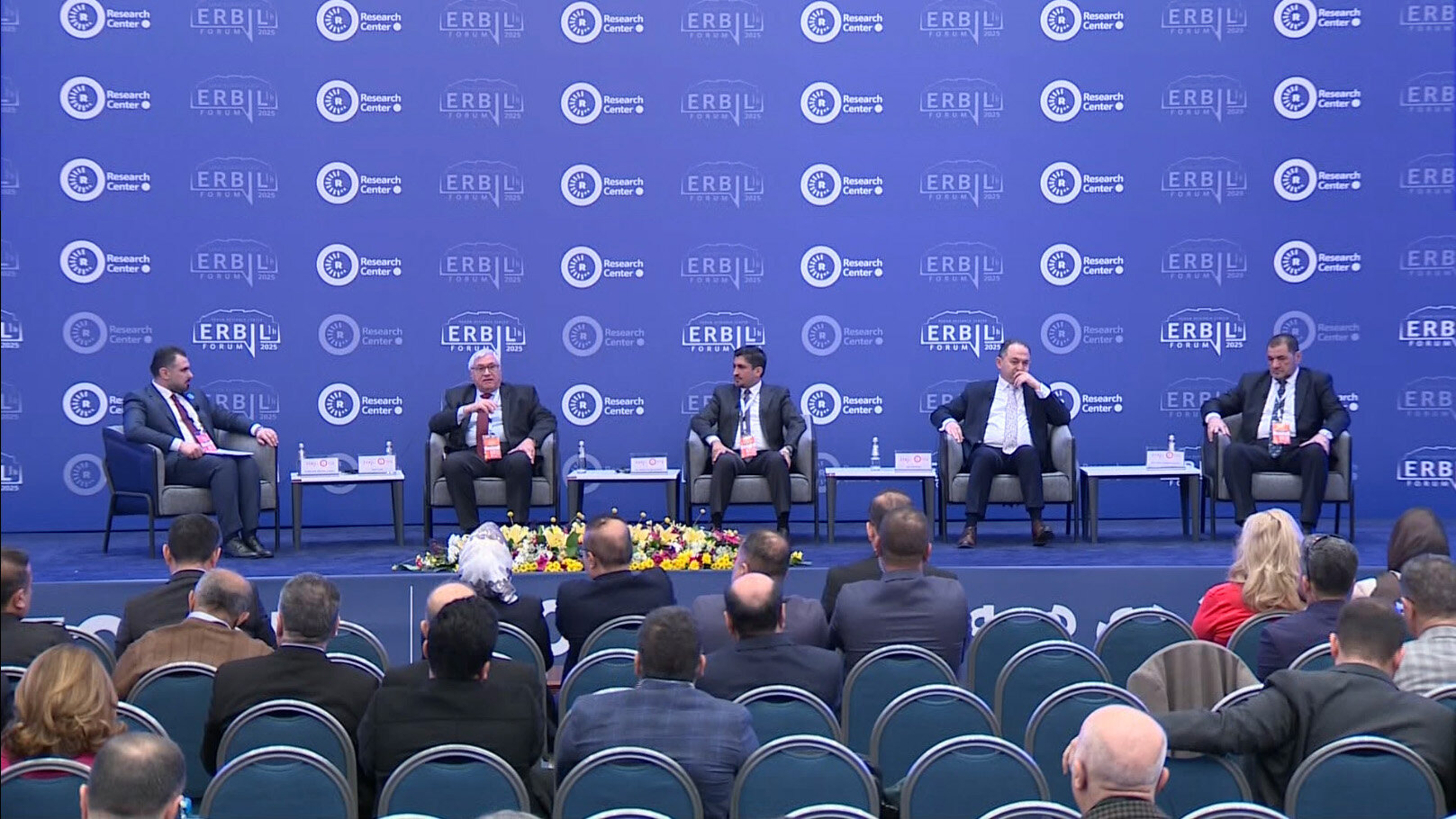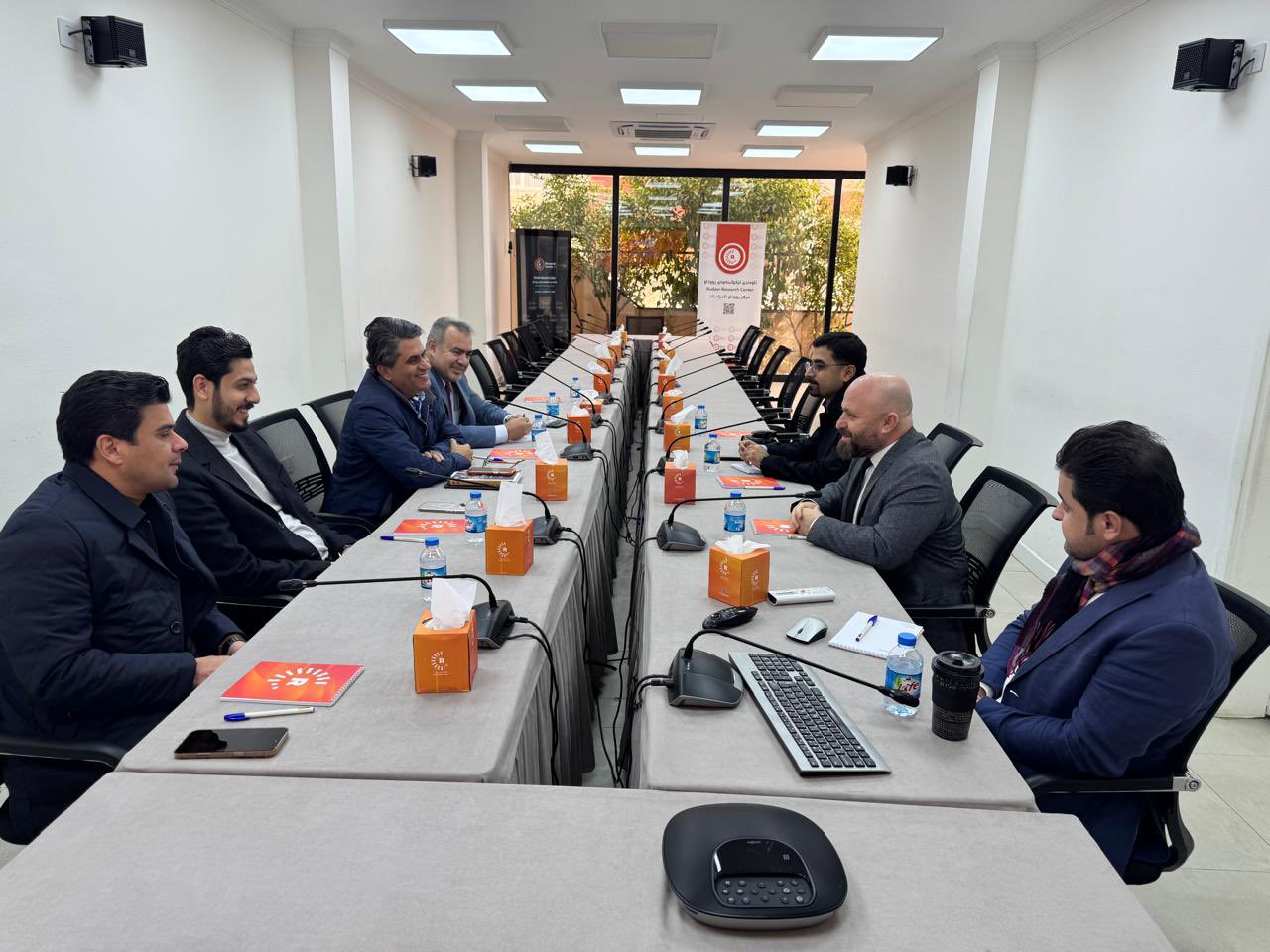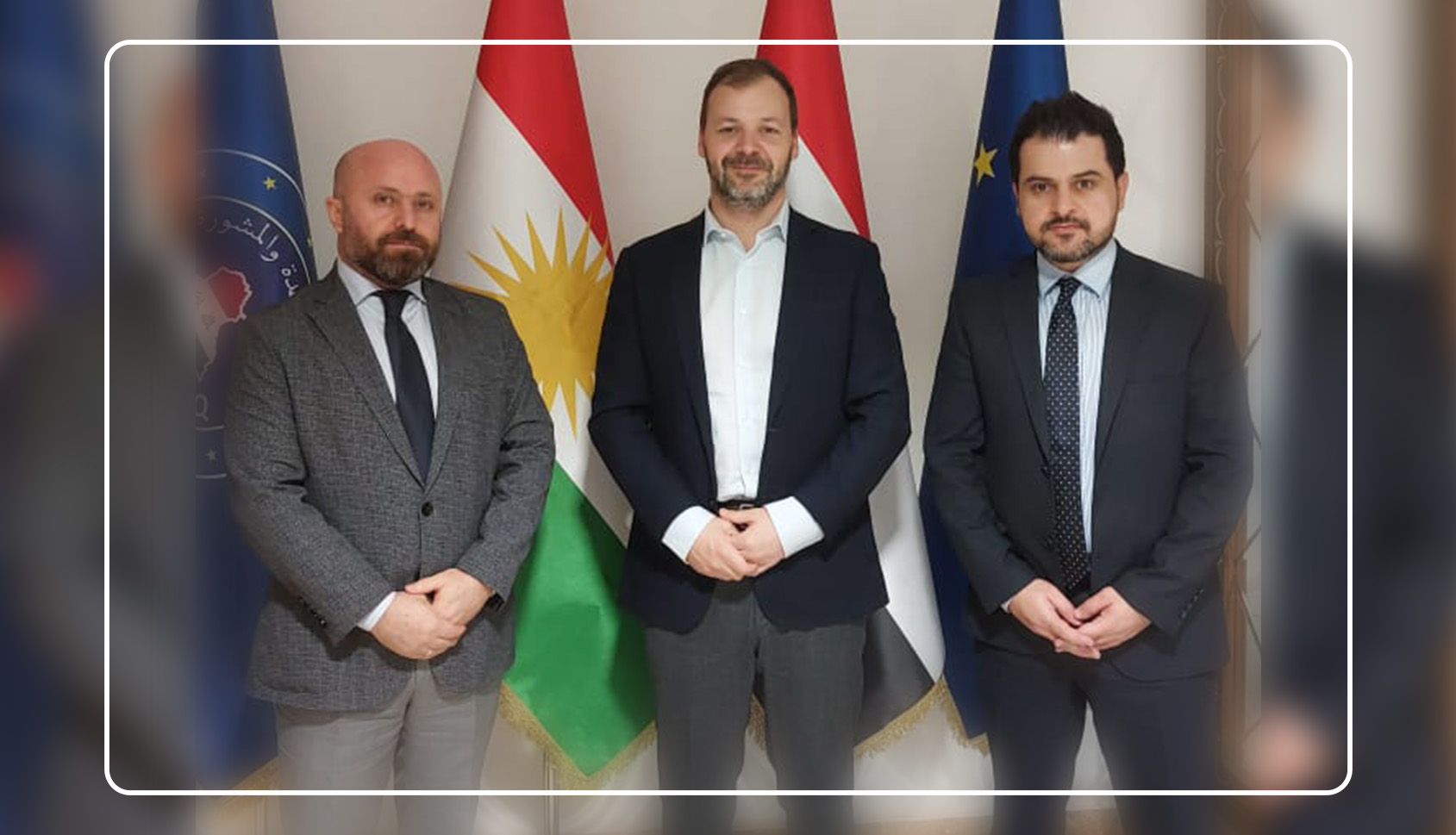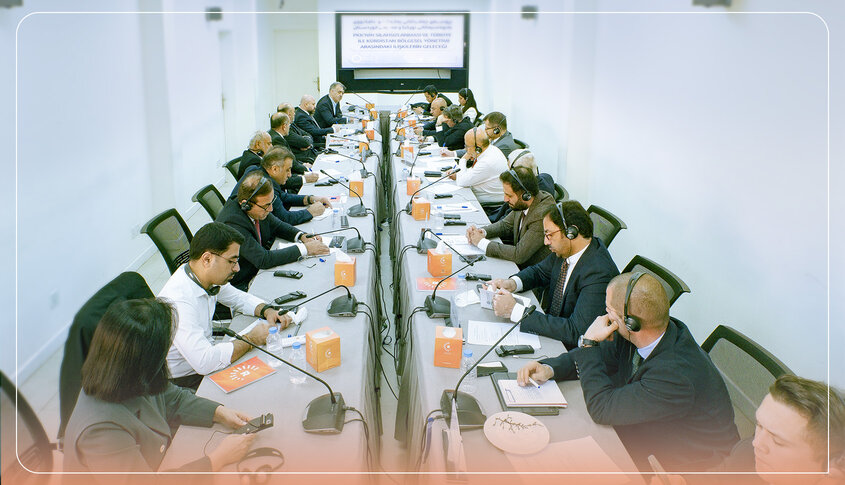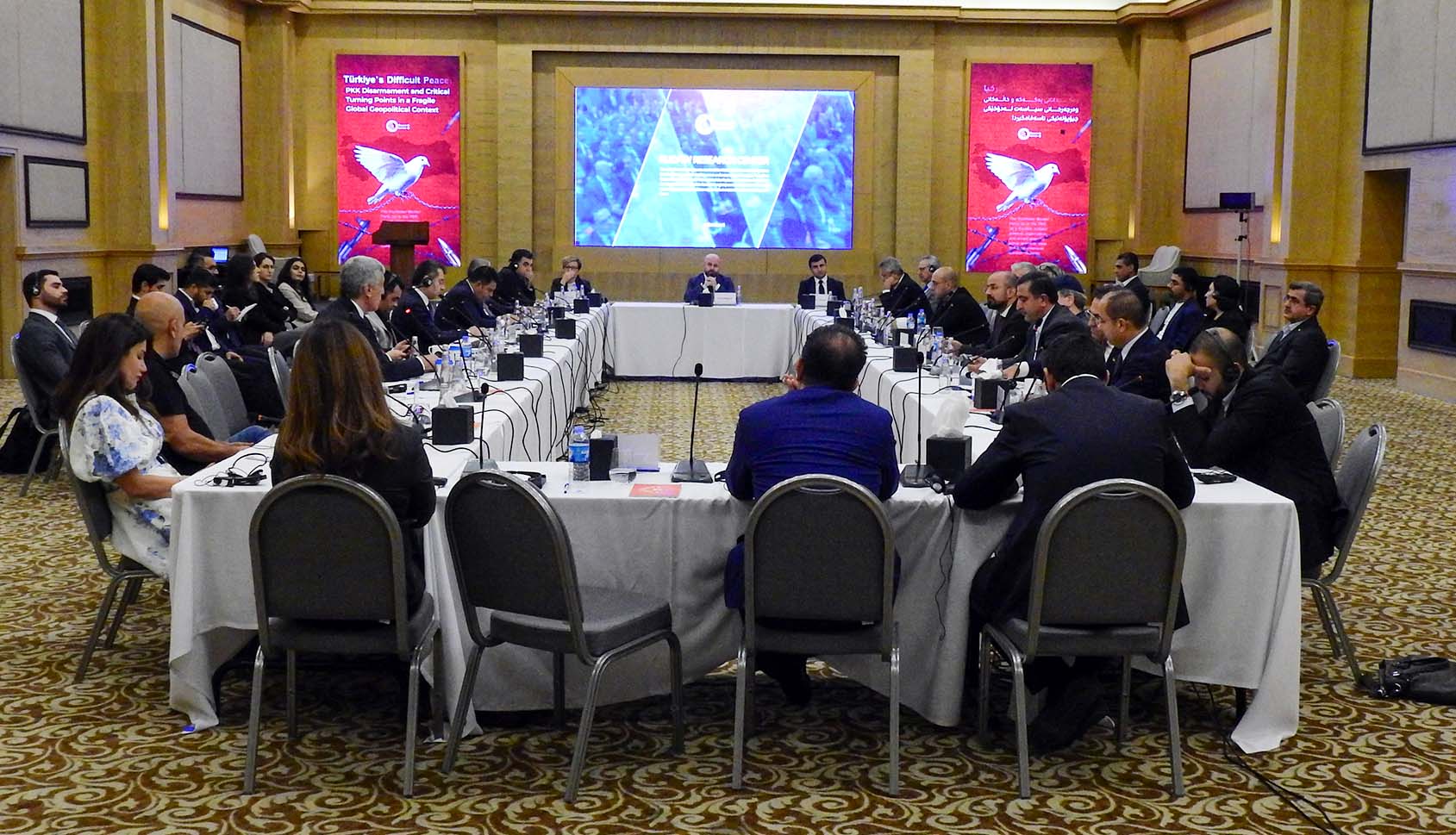Panel 09: Prospects for the 2025 Iraqi Parliamentary Elections – A New Stage of Tension or a Direction for Peaceful Power Rivalry
10-04-2025
Mustafa Al-Saray:
Dear participants welcome to the 3rd Erbil Conference, organized by the Rudaw Research Center in collaboration with a number of local and regional research centers and institutions. As the 2025 parliamentary elections approach, attention is focused on all issues related to the elections, from amending the electoral law to the nature of the upcoming elections, coalitions, and attempts by political blocs to present a distorted picture of the situation. This also includes the call from Sadr Movement leader Sayyid Muqtada al-Sadr for his supporters to renew their voter registration, which some view as either an attempt to boycott or a move to return to the elections.
We all agree on the complexity and challenges of the electoral process in Iraq, but that should not deter us from engaging in a realistic and political analysis of the upcoming elections.
I am Mustafa Al-Saray, Director of Research at the Al-Bayan Center.
Welcome, Dr. Raed. Despite the long history of leftist political activity in Iraq, the influence of the left remains limited, both legislatively and executively, and even within informal institutions that form part of the political system. This leads us to analyze the position of the left in the upcoming elections based on past and present developments.
So, my question is:
As the election approaches, has the left begun organizing itself for participation? If so, will it do so independently or in alliance with other political parties? In particular, there has been talk that some members of the left may reach an agreement with the Iraqi Prime Minister.
Dr. Raed Fahmi:
Thank you very much, and good morning. I would like to begin by discussing the upcoming elections, their necessity, preparations, and participation. However, we cannot talk about the elections without addressing what lies ahead for Iraq, including the challenges facing the political system and the broader political situation, which also shapes the vision of the left.
First, we believe that the political system is facing a fundamental crisis. This issue is different from the urgent economic, social, and political problems; the fundamental problem lies in the very structure of the new political system and the political process, which are built on sectarianism and ethnicity.
As a result of this entrenched political sectarianism, the structure of the state has been severely damaged. Today, we all agree that our state is weak and largely incapable of providing services, and corruption has become a deeply rooted part of the state.
Over the past two days, the challenges and threats of the region, as well as the changes occurring in the world, have been discussed. Yet, everyone agrees that the importance of states in the world has increased, contrary to the notion that the era of globalization has ended.
Indeed, to confront these external challenges, Iraq must become a strong state—an institutional state, one that not only possesses legal legitimacy but also enjoys substantial social legitimacy and can effectively achieve its goals. Unfortunately, these factors are not present in Iraq today.
Less than 20% of the population participates in elections. While this is legally legitimate, it limits social legitimacy and weakens institutions. In the face of these significant problems and amidst these strong forces, it seems that the state cannot protect itself, its rights, or its sovereignty in all its forms.
Thus, if we wish to move forward and resolve the situation—if we want to lift Iraq out of this cycle of problems and crises—we must ensure that these elections are honest and fair, representing public opinion.
Today, with a turnout of only 18% or 17%, more than 80% of the population is excluded from the electoral process. This presents a major problem. What can be done? As a party, our project is now leftist but also has a civil and democratic character. We demand that the state evolve toward a state of citizenship—one that moves beyond the divisive politics of communities and their associated problems.
Second, the term “change” does not simply refer to altering individuals, political parties, or some political terminology. Change must target the very structure of the state. The state must embrace citizenship and be open to changes in political orientations. We will strive for a national, democratic, and civil coalition first. The political forces are not yet fully determined, but civilian forces will undoubtedly play a key role.
Mustafa al-Saray: Thank you very much. I will definitely return to this topic, but I will now turn to Dr. Aso Faraidoon. Welcome, Dr.
Dr. Faraidoon, the Kurdish political situation may be more complicated, especially when we study the experiences of previous elections. The experience of the most recent parliamentary elections in the Kurdistan Region clearly shows a distinct situation. Could this have an impact on the upcoming parliamentary elections?
This conflict will particularly affect the disputed areas, where the presence of Kurdish forces in one or two major coalitions is crucial. Do you believe the Kurdish parties will resort to wisdom, or will they continue to insist on not overcoming their differences and forming a major coalition? Specifically, in terms of retaining the Sainte-Laguë method, will the 2025 elections follow the Sainte-Laguë mechanism, or will a completely new mechanism be used, different from those in previous Iraqi electoral experiences?
Aso Faraidoon: Good morning. I am truly proud to attend a conference with such diversity, and I hope it leads to successful outcomes.
Your question requires a detailed response, and it is necessary to look back at a very brief historical period. In short, Iraq has gone through three distinct stages in its electoral experience:
- The First Phase: From the establishment of the Iraqi state until 1958.
- The Second Phase: From 1958 to 2003.
- The Third Phase: From 2003 to the present day.
In the first phase, there was a pluralistic system that derived its legitimacy from the council to the government. This system initially arose from the struggle for independence against British rule. After 1945, party laws were passed, and political parties such as the National Party, the National Union, the Democratic National Party, the People's Liberation Party, the Monarchy Constitution Party, and others emerged.
In the second phase, the Free Officers took control and became the supreme authority in Iraq, marking the beginning of a new era characterized by successive military coups. This phase began on July 14, 1958, and included significant events such as the failed assassination attempts on Abdul Karim Qasim, Abdul Wahab Al-Shawaf, and the Baathist coup, among others.
After 45 years of authoritarian rule, which was far from democratic and in which the people had little or no democratic practice, we entered the post-2003 phase. This marked the beginning of pluralism, federalism, and unity. The foundations of the new government were based on national partnership, a parliamentary system, and political agreements between the parties, political components, and political groups.
Now, as we head into the next election, we do so with more experience and in a different phase. As Professor Raed Fahmi mentioned, external and regional influences and current changes may impact this phase, and these effects will become more evident in the coming months.
The truth is, we are uncertain about how the relationship between the United States and our neighboring countries will evolve, or what the future of neighboring Syria will be. These are significant external issues that will also affect the elections.
Internally, let me begin with the Kurdish issue. For the Kurds, participation in the elections is about strengthening their partnership in Baghdad. We all know that this partnership has gone through various phases—sometimes strong, sometimes retreating.
Mustafa al-Saray:
Well, Dr. Faraidoon, this is a simple question. In the partnership phase with Baghdad, can a new strategy be developed for the Kurds to deal with the Arabs, both Sunnis and Shiites, in Baghdad in the upcoming elections?
Dr. Aso Faraidoon:
At present, we see greater attention and more effort being put into strengthening the Kurdish presence in the Iraqi Parliament. Initially, this involves strengthening the partnership and playing a key role in the government and political process. There are also other critical issues, such as the matter of disputed areas, which I prefer to call shared areas, that have not been fully resolved yet. We also face ongoing budgetary issues and other challenges.
Therefore, political parties—particularly the two main ones, the Kurdistan Democratic Party (KDP) and the Patriotic Union of Kurdistan (PUK)—always strive to secure a stronger presence in Baghdad compared to previous elections.
Based on my prediction, Kurdish participation in the political process at the Iraqi level will increase. Several objective factors lead me to this conclusion:
First, the decision of the Sadrist Movement to rejoin the political process, if they decide within the next two months, will have a significant impact on participation, especially in the southern and central governorates.
Second, let’s be honest, the clear intention of the Prime Minister to participate in these elections, and how he plans to participate, will play a role. Finally, our Sunni brothers are also re-engaging with the elections. Mr. Halbousi’s position, which was previously weakened, is now taking advantage of this situation for a strong comeback.
Overall, I predict that participation in the Kurdistan Region will be higher than the last time, but not as high as the Kurdistan Parliament elections, which saw a remarkable 72% turnout due to the intense competition between the two main parties. However, the intensity of the competition, as you mentioned in your question, may be less this time. This is because the experience of intense competition has not always produced favorable results, especially regarding Baghdad, where there are now proposals for a joint position for the future.
Mustafa al-Saray: I'll come back to you, don’t worry. Now, I’m going to Dr. Mustafa Ayash Al-Kubaisi.
One of the most prominent issues in the Sunni political arena is the absence of a clear strategy that unites Sunni forces, similar to what the Shiite political forces did within the Coordination Framework when they formed a government. This framework remains united to this day and is described as a successful government. Dr. Aso referred to changes in the Sunni arena.
Anbar is no longer the only province that determines the fate of the Sunni political landscape. There are also changes in Sunni political forces and Sunni voters, both in Taqaddum and other parties. Therefore, some say the Sunnis are in their weakest position because they are scattered and not united, while others argue that this dispersion is a strength for the Sunni side, allowing them to gain several achievements from it. For example, broader relationships with other parties, especially with Kurds and Shiites. From your perspective, what is your opinion regarding Sunni-Sunni conflicts?
Dr. Mustafa Ayash Al-Kubaisi: First, I’d like to thank Rudaw and the Al-Bayan Center for this opportunity. The Sunni situation may be different from the Kurdish and Shiite situations for several reasons.
Perhaps the Shiite house had organized itself since the 1990s and prepared for the post-2003 phase. The Kurdish house also organized itself and anticipated what would happen. However, the Sunni house and Sunni forces in the pre-2003 phase didn't really exist except for a formal presence at the London Conference or elsewhere.
If we look at today’s landscape, more than one election cycle has passed, and Sunnis have remained preoccupied with the idea of participating in elections. They ask whether elections are permissible (halal) or forbidden (haram). How should we deal with this transitional phase? There was no prepared Sunni project for the post-2003 phase, which caused even Sunni provinces to be hesitant in decision-making and representation. Perhaps this hesitation continued until the last two election cycles.
This may have been used in some way by other partners. Today, we're discussing the Sunni mood, which in 2006 moved with the culture of components and sub-identities, with 10-15% participation. Later, it moved towards nationalism with Ayad Allawi in 2010, hoping to create a new project and identity. Unfortunately, this project was not successful and did not reach its conclusion.
After the 2010 phase, Sunnis accepted that the culture of components was dominant, and the political system did not allow for other options. They must work as Sunnis and then, after the election, form vertical and horizontal alliances with whomever they choose.
The phase we have reached today reveals the intensity of conflicts within the Sunni community. These conflicts are such that, from Ali Al-Wardi's classification until today, there are conflicts within the Shiite house, conflicts within the Kurdish house, and conflicts within the Sunni house as well, with intense disagreements.
This means a psychological message has been conveyed to Sunni voters, discouraging them from participating in elections. Dr. Raed mentioned that the participation rate does not exceed 20%. In Baghdad, for example, the participation rate in Amiriyah was 13%, while the participation rate in Sadr City reached 60%. In other areas of Baghdad and the shared provinces, the Sunni community remains disengaged. Part of this non-engagement is due to conflicts between Sunni leaders, and part is due to a lack of faith in the system among their partners. For instance, Sunnis have spoken about sovereign entitlements, but today, even football, sports organizations, the Olympic Committee, the Ministry of Youth and Sports, and the Football Federation are all under the control of one party.
If this is the case, how can we encourage Sunni voters to participate in elections? How can we encourage those who still have doubts and have not fully integrated into the political process to engage and secure their political rights, as well as the rights of their community? I remain optimistic despite the fact that today there is relative stability in the Sunni community, which is moving towards the political process and national stability. Without a doubt, the Sunni community is essential to the country's stability. Any instability—God forbid—that occurs in Anbar would cause turmoil across the country. Any disturbance in Mosul would affect all other provinces. Today, the world is interconnected, and Iraq is a country where instability in any province impacts the others.
I am also optimistic that there is a new generation of Sunni leaders. Perhaps you will see them in the elections, thinking differently. They do not rely on external support or political funding; instead, they genuinely want to live in Baghdad and Erbil, and they view Erbil, Sulaymaniyah, and Baghdad as beautiful places. They wish to live domestically and don't want to be tied to external influences. This is a brief answer to the question.
Mustafa al-Saray: Thank you very much, Dr. Now, let me turn to Dr. Rafe Abdul-Jabbar. Dr., you have experience with the electoral process in Iraq—as a former member of the House of Representatives, particularly with a major list like the Sadrist Movement, and as one of the negotiators facing many significant obstacles. There have been technical challenges related to the electoral law and the conduct of the electoral process, as well as political challenges such as low turnout and concerns about the deterioration of the political balance, especially after the Sadrist Movement's withdrawal. There are also social concerns and worries about future changes. Many in Iraqi society believe the upcoming elections may serve as a gateway to the expected change in Iraq, making the process a great concern. Additionally, they see Sadr’s campaign for registration as an attempt to re-boycott and reduce turnout or perhaps even return. This has raised concerns among some.
In your opinion, are these obstacles real, on-the-ground challenges, or are they simply normal hurdles that any electoral process faces?
Rafi Abdul-Jabbar:
In the name of God, the Most Gracious, the Most Merciful. Thank you for this question. The next phase, and the 2025 elections, are different from the previous five rounds due to several factors, the most important of which are some domestic challenges, as you mentioned. There is the expected 20% recession, as Dr. Mustafa mentioned.
This, in itself, is evidence of dissatisfaction with the current political system, which is not a positive sign. The new political system is still relatively young. Although 22 years have passed, compared to other regimes that have ruled Iraq, it is still in its early stages and needs further development. It is the responsibility of the Iraqi political leadership to protect the current political system.
Another challenge, as you mentioned, is the electoral law. The return to the Sainte-Laguë system and the increase in the threshold to 1.7 is not a good sign. For example, this prevents independents from running under individual titles, and disincentivizes small blocs and civilians from participating. These are all challenges that will likely contribute to the recession.
This will have an impact and increase the likelihood of a return to the 2019 situation and the challenges faced by the political system, which ultimately led to the collapse of the government and the dissolution of parliament. The political leadership must be aware of this, because the real challenge now is proving the viability of the political system.
In my view, the biggest challenge is external. You’ve mentioned the internal challenges, but the external challenge is the change that has taken place in the region since October 7, whether in Palestine, Lebanon, or Syria, where regime change is still unclear. Even the statement issued two days ago is not something we can be happy about, because many Syrian communities were not represented, including the SDF, which is a dangerous sign. It is also unclear what future map has been drawn for Syria, as international intervention by countries like Turkey, the United States, and France will change the entire structure of the regime.
Something seems to be planned, perhaps a new political system for the Middle East, and there are many indications pointing toward that. I expect the biggest challenge to be linked to Trump returning to power, so all political forces, especially the Iraqi political system, should be aware of this. The Iraqi political system, with these elections, is facing the challenge of proving its existence and continuity.
Trump's potential return has raised concerns not only regionally but globally, because the events and discourses emerging in international relations have not occurred in the 80 years since World War II. Today, he annexes Canada and the Grenada Islands, claims Panama, sails across the Gulf of Mexico, and calls it the "Gulf of America."
The biggest challenge to this direction is the resolution of the Ukraine conflict, which I expect will concern the EU, especially given that it has reached an agreement with Putin to resolve the Ukraine conflict. This is a dangerous sign.
All these challenges, dear sir, must be taken into account by the Iraqi political leadership in the upcoming elections to establish a capable government that can navigate this complex situation. The previous foreign policy approach to international issues should be revised.
Mustafa al-Saray:
Well, Doctor, will the Sadrist Movement return to the political arena in the upcoming elections, or not? Will they return alone with the same strategy as in 2021, or are we witnessing a new strategy—especially given the presence of a very strong Shiite faction that continuously claims to have an open hand for the Sadrist Movement, namely Mr. Maliki’s faction? Is it possible to see a coalition between them?
Rafi Abdul-Jabbar Al-Azzawi:
I can summarize the Sadrist Movement in one sentence. Since the beginning of the political system, the Sadrist Movement, like Martyr Sayyid—may God have mercy on him and sanctify his soul—has always been in positive opposition. From the very start, it opposed and voted against the Strategic Framework Agreement with the United States. It was possibly the only faction to take this position and embarrassed other political factions, including Shiite factions.
In the second term, they were involved in the political system and government but maintained their own position. They also opposed the 2013 Khor Abdullah agreement. Yes, some personalities were with us, but in individual capacities, not as factions. The evidence is that today, Iraq is burdened by the Khor Abdullah agreement and still doesn’t know how to resolve it, although the Federal Court has ruled that it goes against constitutional requirements.
In 2018, the Sadrist Movement went further because they realized the political consensus governing Iraq couldn’t bring about a conclusion that would create a state based on institutions rather than sects.
Regarding the Sadrist Movement’s campaign to renew its electoral card, this doesn’t necessarily mean they will participate. It was simply a clear expression to renew the card, as the obstacles are significant, and the entire Iraqi population needs to express their opinion. I believe it’s still too early for predictions.
Mustafa al-Saray:
Thank you very much, Dr. Al-Azzawi. Dr. Aso, I’ll return to this question: Yesterday, Mr. Mashhadani mentioned something new regarding the electoral law that is being prepared. Will the Kurds have their own position on this law? Will they have a clear stance? Will the Kurdish demands in Iraq lead to the creation of a unified electoral constituency, particularly in the disputed areas under Article 140? Do you have a strategy for this? You have five minutes to respond, if possible.
Aso Faraidoon: Of course, everything currently being discussed about the enactment of a new electoral law is still in the negotiation stage between the political parties. It is very difficult to arrive at or pass a law that is in everyone's best interest. This is challenging, but the Kurdish parties, the Sadrist Movement, the Coordination Framework, and Sunni parties must all be considered in order to reach a law that minimizes disagreements.
It is also clear that there is concern about multi-constituency legislation and the Saint-Laguë method, so they are looking for some kind of legislation that is a combination of the two. Thankfully, what matters so far is that the elections are expected to take place on time in October or November. More importantly, the parties are committed to holding the elections, as this is a crucial part of the continuation of the democratic process, especially its timely conduct.
As for your question, which I believe was about disputed areas, in my opinion, the disputed areas, as you mentioned, are related to Kurdish partnership. The Kurds are a key partner in the Iraqi state and have been part of the establishment of the Iraqi state. The Kurds had 17 representatives in the Constituent Assembly in 1925, out of 85 members. They were part of the defense, part of the partnership, part of the writing of the constitution, and part of the fight against ISIS.
Therefore, I think there should be more emphasis on a strong Kurdish presence in Baghdad to consolidate and strengthen the primary and genuine partnership in Baghdad, as Mr. Nechirvan Barzani mentioned yesterday. Additionally, the issues related to salaries and employees should hopefully be resolved through genuine presence and genuine dialogue between all parties.
Mustafa al-Saray: Thank you very much, Dr. Mustafa. You mentioned future alliances. I couldn’t help but ask you earlier, how do we understand alliances? Will we see one major coalition or two? Some Sunni political forces have opposed the Kurdish brothers' demands to amend the land ownership law. Will this affect their future coalitions? How does this influence the coalitions?
Dr. Mustafa Ayash Al-Kubaisi:
Dr. Raed may have been talking about sectarianism, and I would like to acknowledge Dr. Abdul Hussein Shaaban, who was the first to propose a law banning sectarianism in 2005. Therefore, today, the culture of sub-identities and the culture of communities dominates the political system in Iraq. A new front of new forces may emerge among individual parties and large tribes to win more seats in Parliament. Additionally, the absence of Sunni voters in the elections will lead to the Sunni population losing at least 20 seats in each election, especially in the mixed provinces, which will affect the attendance in Parliament itself.
The Sunni community in Iraq, comprising 70% to 80%, is dissatisfied with the political process. Today, efforts to persuade this percentage of the Sunni public to participate and engage with the political process and the state must include new political figures and new programs. Moreover, it would be better if the competition is not only through weapons, political money, and similar means, but rather if we see competition based on programs, ideas, and projects in the next electoral cycle. It is also possible that, in the upcoming elections, the new generation of Sunni youth will play a prominent role.
Mustafa al-Saray:
Thank you very much, Dr. Mustafa. I'll now go back to Mr. Raed. The left is often criticized for not being present during and after elections. Is the problem with the elections, the law, or the political system? Will the left be present from start to finish in this election?
Dr. Raed Fahmi:
We, as leftist and civil forces, are working based on a program that has a national character and advocates for change. This equation is very important. The obstacles you mentioned are obstacles for the country—national obstacles. Accordingly, any project must have a clear national dimension. Unfortunately, we see that most of today’s political forces talk about component-based projects, which aim to derive the national project from the component project, while it should be the other way around. Our project has a national dimension and a transformative goal, but this does not mean that we are repeating the governance systems of Iraq.
It seems all forces view elections as a mere vote-gathering process. Yes, this is part of it, but when the country is suffering from major issues, we need to discuss them. Elections should be about how to confront these obstacles. How do different visions compete? Are the different forces presenting programs and visions, or is it merely political restructuring? Regarding alliances, we truly believe that the region is in a state of great danger and uncertainty.
I heard the Speaker of Parliament speaking as if everything was running smoothly and we only had occasional quantitative and qualitative issues. No, not at all. Even the stability we talk about is relative. Economic problems may even grow larger. Therefore, I say we are ready, and we demand to confront the major problems and realize that we need change; we need deep reform. In the end, we are allied with civil forces based on a law that suits them. I believe that sectarian and component-based discourse is incompatible with managing the country's affairs.
Mustafa al-Saray:
Thank you very much, Mr. Raed. Dr. Rafi, if the Sadrist Movement returns, will we see a Sadrist-Kurdish alliance like what happened in 2021? If the Sadrist Movement does not return, what is your message to the current politicians?
Rafe Abdul-Jabbar:
The principle is that you cannot talk about alliances unless it has been determined beforehand whether you will participate or not. Participation has not yet been determined or announced. Yes, there has been a call considering that the Sadrist popular base today is part of the Iraqi people, and they also bear responsibility for solving future obstacles, so their influence should be visible in the upcoming elections. As I said, we need to focus more on external obstacles than internal ones. But once their participation is determined, we can then talk about alliances.

